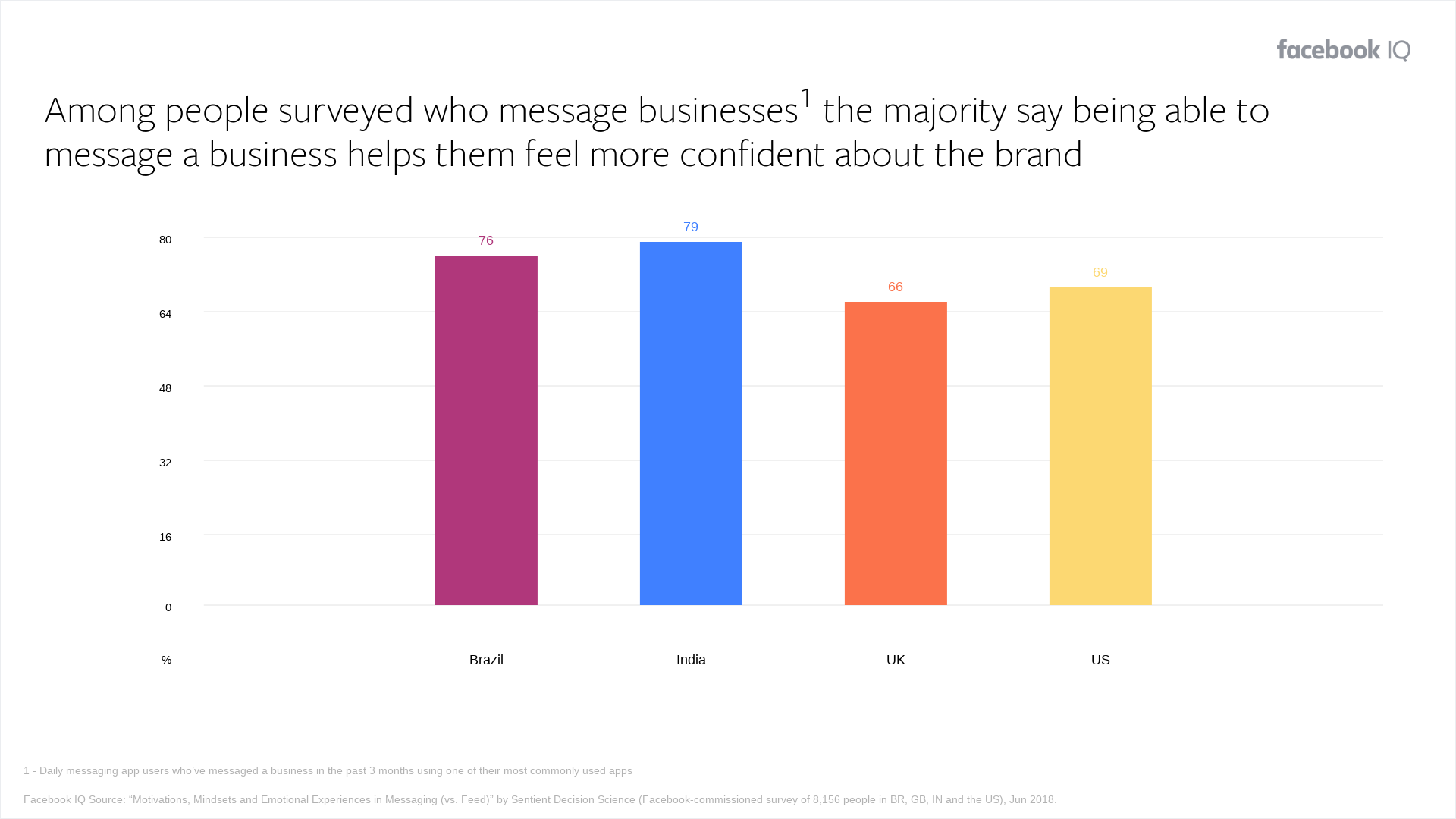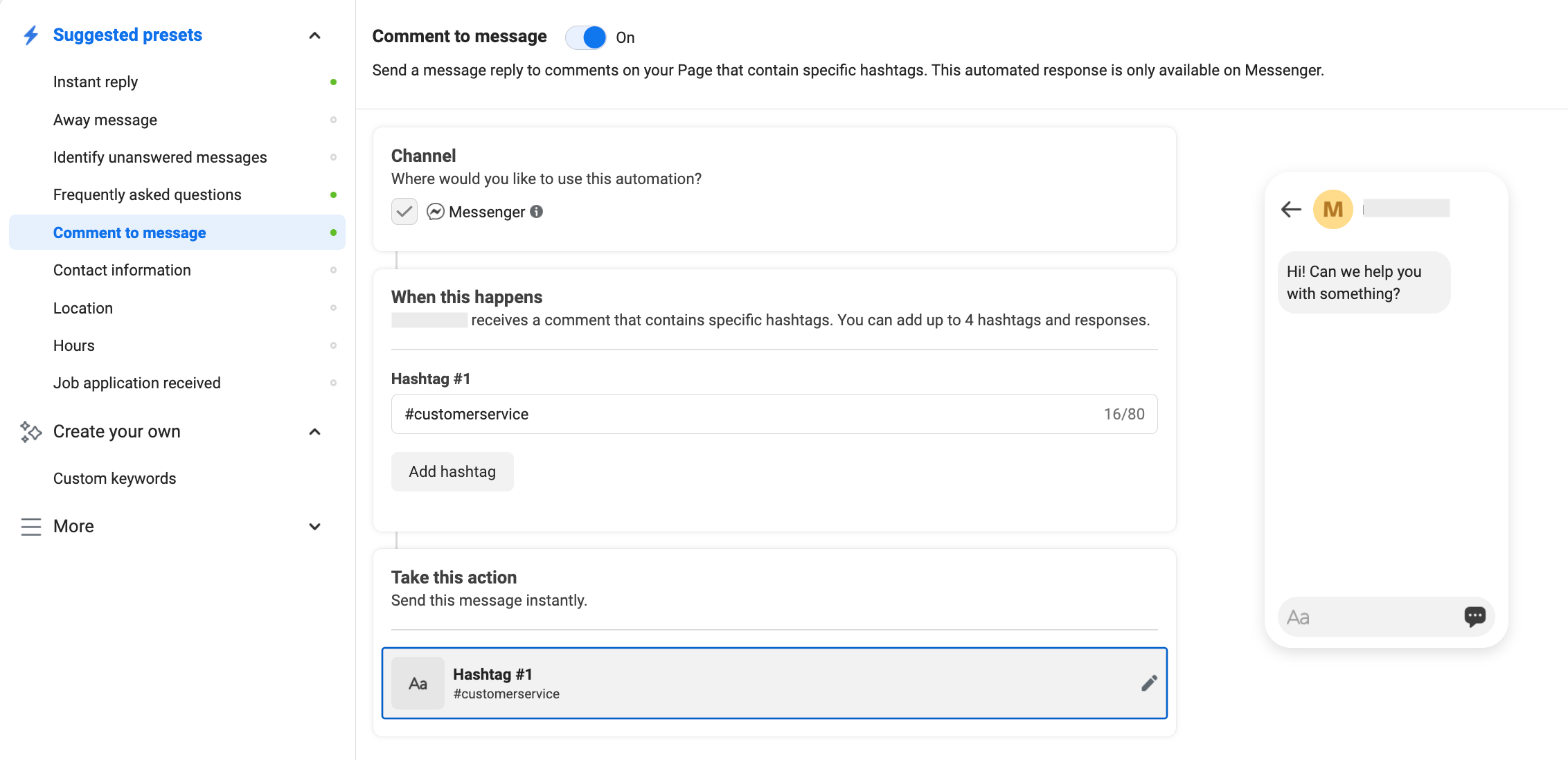How to use Facebook Messenger: A guide for businesses
Written by Mahnoor Sheikh
Published on May 23, 2022
Reading time 7 minutes

Facebook Messenger is a cross-platform instant messaging app developed by Facebook (now Meta). With nearly 1 billion monthly users, Messenger can be an indispensable marketing tool for brands looking to connect with customers on Facebook.
In this article, we’ll walk you through the benefits of Facebook Messenger for business, and how to use it to build relationships with customers and sell products. We’ve also included some tips and best practices to help you make the most of this feature.
Let’s get started.
Why use Facebook Messenger for business
Facebook Messenger can be an integral part of your Facebook marketing strategy if you know how to use it right. It’s the most popular messenger app in the US, with 82% of consumers claiming they use it regularly for instant messaging purposes.
Below are are some specific ways Facebook Messenger can benefit your business:
1. Generating high-quality leads
Customers might reach out to you on Facebook for many reasons, but one thing is clear—they have displayed an active interest in your business by doing so.
This is a chance for your brand to generate leads and nurture them into customers by holding meaningful conversations. This could involve educating interested people about your products or services, answering their questions, addressing feedback and more.
You can also set up Facebook ads targeting potential customers and encourage them to get in touch with you via messages. Hyundai Australia, for example, reduced their cost per lead by 27% by running Messenger ads that prompted users to get in touch for a test drive.

2. Providing exceptional customer service
Bad customer service can make you lose business. But if you’re wondering exactly how much, Zendesk’s 2022 report shows that 61% of customers will walk away from a brand after just one poor customer service experience.
Using apps like Facebook Messenger for customer service can help you save some of that potential revenue. Not only are you able to provide fast and efficient responses to customer queries, but you are also giving them a personalized, private platform to voice their thoughts and concerns. According to the 2022 Sprout Social Index™, the platform US consumers and brands use most for customer service is Facebook.

3. Enabling convenient purchases and transactions
Facebook Messenger is great for holding conversations, but it can also help streamline the customer journey by making transactions a breeze. Customers can make purchases, book appointments, check-in, apply for refunds more directly through the app.
In the US alone, as many as 75% of customers have made a purchase or transaction through Facebook Messenger. And with 60% of people saying they would pay more for convenience, it’s a no brainer why brands should think about using Messenger for selling purposes.
4. Building trust in your brand
Facebook Messenger offers brands an opportunity to engage in personal conversations with customers, which helps build trust.
A Facebook study showed that 69% of customers in the US felt more confident about a brand they were able to message. Additionally, 55% of customers said they felt more personally connected to such brands.

5. Creating a ‘safe space’ for sensitive conversations
We mentioned above how Messenger allows brands to offer a private platform to customers to voice their feelings. This can also be a great way for brands to resolve particularly complex issues in private.
For example, your business might have made a mistake and you want to resolve the issue quickly without driving away other customers. By asking disgruntled customers to contact you privately via Messenger, you’re able to provide one-on-one customer service and keep a potentially risky situation under control.
How to use Facebook Messenger for business
Now that you know the benefits of using Facebook Messenger, let’s talk about how you can implement it for your own business. Below are a few ways to get started with Facebook Messenger on the right foot.
1. Set up Messenger on your business page
When you create a business page on Facebook, it’s likely that Messenger will already be enabled on your page.
However, if you still want to check and confirm, you can go over to your page settings, click on General, and see if “People can contact my page privately” is enabled next to Messages.

If it’s not enabled already, click on Edit in the same row, and turn on the feature. You will now be able to receive private messages from Facebook users.
As for sending private messages as a business, you can only message users who have contacted your page first.
2. Add a Send Message button to your profile
You can encourage users to get in touch with you on Facebook by adding a blue button on your page. Simply go to your page, click on Add a Button and select Send Message from the list.

You can customize the CTA so it appeals more to your audience. For example, Hyatt’s Send Message button says “Get Started” to inspire action.
3. Allow messages from event guests
If your business hosts and/or promotes events on Facebook, you can enable guests to make reservations, ask questions or get in touch with you for any other purpose by messaging you about it.
When you’re creating your event, go to Event Settings and enable the messaging checkbox.
4. Enable automated responses
One of the best things about using Facebook Messenger is you can automate certain responses to connect with customers faster and more efficiently.
Below are some automated responses you can set up on Messenger for your own business.
Instant reply
You can set up instant replies to send an automated message right after a user messages your business page.

Use instant replies to thank people for getting in touch, or for communicating when they could expect a reply or solution from you.
Away message
You can set up away messages that will be automatically sent to people who contact you when your Messenger status is set to Away.

This is useful to avoid ghosting people if they contact you outside of working hours or when you’re unavailable for any reason.
Answers to FAQs
In Messenger, you can add specific questions, such as FAQs, and then create standard responses to those questions.

These questions could also be added to a menu so users can simply select and send instead of typing from scratch. It helps your business respond faster to common queries and concerns.
Plus, with automation taking care of FAQs, your customer service reps can focus more on complex issues that need more elaborate solutions.
Comment to message
Facebook Messenger also lets you set up automatic responses to comments on your page that contain specific hashtags.

This is especially helpful if you’re running a campaign or competition that involves using hashtags. For example, let’s say you’re a skincare brand running a challenge where users share their stories using the hashtag #myskinstory.
Every time there’s a comment containing that hashtag, you can send that user a message thanking them for their story. Better yet, ask them for permission to repost and leverage user-generated content.
5. Track Messenger analytics
To help you better understand customer engagement, Facebook lets you track some insights related to Messenger conversations.

These insights mainly include the number of conversations, messaging connections, blocked and reported connections, and your overall block rate during a specific period of time.
4 tips for using Facebook Messenger
Knowing why you should use Facebook Messenger for business isn’t enough; you should also maximize its potential using the following tips and best practices.
1. Be responsive
Responsiveness could make or break the customer experience on Facebook Messenger. According to a 2018 HubSpot study, consumers typically expect businesses to respond on a live chat in 10 minutes or less.
This year, support leaders have reported that customer expectations are at an all-time high. So, it’s crucial that you use Messenger for business to provide quick and relevant responses to your customers about sales and support queries.
You can also create external chatbots for Facebook Messenger. You can do this using Sprout’s Bot Builder, to respond faster and more efficiently to customers. The tool is easy to set up, and helps you visualize the customer journey and provide relevant experiences.

Additionally, you can use Sprout’s Smart Inbox to keep track of all your messages across multiple Facebook pages and other social platforms in one place. Easily search and filter messages, view conversation history, respond faster and more.
2. Personalize your messages
In addition to faster responses, customers also expect (and value) personalized replies from businesses. Your customers want to feel important. And no one wants to talk to a robot that doesn’t empathize with their concerns.
Here’s an example of a personalized response from Shopify:

Here’s where the Sprout Smart Inbox feature comes in handy by offering a built-in system for managing customer relationships and your conversation history. This lets you quickly pull up past conversations and notes for a specific customer, enabling you to give relevant responses.
Now, this doesn’t mean you should avoid using automated replies and chatbots. It means you should use these tools wisely. Messenger, for example, gives you the option to personalize your automated responses by incorporating the user’s name.
3. Retarget users who sent you a message
As we mentioned above, Messenger is an excellent tool for lead generation. But what’s even better is you can retarget these leads on Facebook and nurture them into customers.
When you set up ad targeting on Facebook, you can narrow it down to users who have sent you a message in the past. These people have already shown interest in your business or product, and retargeting them can help you drive more engagement and conversions.
Here’s how Shopify does it.

4. Keep your brand voice consistent
Your brand voice shouldn’t extend to just your social posts and emails; it should be consistent across all touchpoints. That includes your conversations via Facebook Messenger. So, besides training your live chat agents, make sure your chatbot responses align with your brand voice too.
Boost your Facebook marketing strategy with Messenger
Facebook Messenger can help you build profitable, long-term relationships with customers on the platform. It can also help you reduce friction and drive more sales, deliver exceptional customer experiences, generate leads and more.
If you’re looking for help building out a winning social media strategy, download our toolkit for social media success in 2022. It includes guides, templates, checklists and other resources to help you take your social media marketing to the next level.
- Categories
How to schedule a post on Facebook in 2024
Published on June 25, 2024 Reading time 8 minutes - Categories
Facebook marketing: The complete guide for your brand’s strategy
Published on June 24, 2024 Reading time 19 minutes - Categories
Facebook Analytics: A guide to Facebook insights
Published on May 28, 2024 Reading time 13 minutes - Categories
11 Facebook analytics tools to measure your marketing success in 2024
Published on April 17, 2024 Reading time 5 minutes


Share